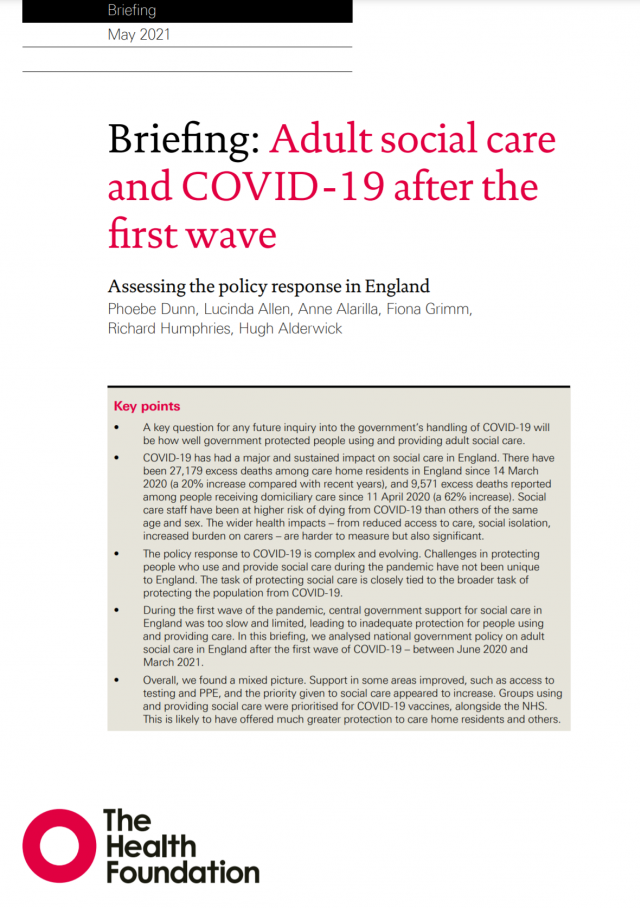Adult social care and COVID-19 after the first wave: assessing the policy response in England Our analysis of the national government policy response for social care between June 2020 and March 2021
May 2021

Key points
- A key question for any future inquiry into the government’s handling of COVID-19 will be how well government protected people using and providing adult social care.
- COVID-19 has had a major and sustained impact on social care in England. There have been 27,179 excess deaths among care home residents since 14 March 2020 (a 20% increase compared with recent years), and 9,571 excess deaths reported among people receiving domiciliary care since 11 April 2020 (a 62% increase). Social care staff have been at higher risk of dying from COVID-19 than others of the same age and sex. The wider health impacts – from reduced access to care, social isolation, increased burden on carers – are harder to measure but significant.
- During the first wave of the pandemic, central government support for social care in England was too slow and limited, leading to inadequate protection for people using and providing care. In this briefing, we analysed national government policy on adult social care in England after the first wave – between June 2020 and March 2021.
- Overall, we found a mixed picture. Support in some areas improved, such as access to testing and PPE, and the priority given to social care appeared to increase. Groups using and providing social care were prioritised for COVID-19 vaccines, alongside the NHS. This is likely to have offered much greater protection to care home residents and others.
- However, major challenges remained. Government policy on social care was often fragmented and short-term, creating uncertainty for the sector and making it harder to plan ahead. There have also been persistent gaps in the national policy response, including support for social care staff and people providing unpaid care.
- A lack of publicly available data means that we only know so much about the impacts of the pandemic on social care, and the success of policies to support the sector. Data on care provided outside care homes are limited and hard to interpret. This is concerning, given the sustained increase in mortality reported among people receiving care at home.
- Major structural issues in social care have shaped the policy response and effects of COVID-19 on the sector, including chronic underfunding, workforce issues, system fragmentation, and more. COVID-19 also appears to have made some longstanding problems worse, such as unmet need for care and the burden on unpaid carers.
- Comprehensive reform of adult social care in England is needed to address the longstanding policy failures exposed by COVID-19. Immediate policy action and investment is also needed to support the system to recover from the pandemic and prepare for potential future waves of COVID-19.
Adult social care and COVID-19 after the first wave: Assessing the policy response in England reviews national government policies on adult social care in England after the first wave of the COVID-19 pandemic – between June 2020 and March 2021. This briefing follows our analysis of the policy response during the first wave published in July 2020.
In this briefing, we analyse policies to support adult social care during the height of the second wave of the pandemic in January and February 2021, and in the months leading up to it. We provide a narrative summary of central government policies related to adult social care in different areas, such as policies on testing and support for the workforce. We also provide a summary of the latest publicly available data on the impacts of COVID-19 on adult social care. In the final part, we make an assessment of the policy response since June 2020, consider how policies changed over time, and identify priorities for the future.
We argue that support in some areas improved after the first wave, such as access to testing and PPE, and the priority given to social care appeared to increase. However, we found that major challenges remained, policies in several areas continued to be slow, fragmented, and short-term, and gaps in the response risk increasing inequalities. Underlying structural issues – underfunding, workforce issues, fragmentation, and more – made the social care system vulnerable to a major shock.
We identify several priorities to help prepare for potential future waves of the virus. Short-term actions should include greater involvement of social care in planning and decision making, improved access to regular testing and PPE, and a commitment to cover the costs of local government’s COVID-19 response.
More fundamental reform of social care is needed to address the longstanding policy failures exacerbated by COVID-19. This reform must be comprehensive, including action to improve pay and conditions for staff, stabilise the care provider market, increase access to publicly funded services, and provide greater protection for people against social care costs.
Cite this publication
Further reading
Work with us
We look for talented and passionate individuals as everyone at the Health Foundation has an important role to play.
View current vacanciesThe Q community
Q is an initiative connecting people with improvement expertise across the UK.
Find out more


